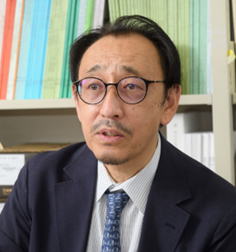Welcome Message
Welcome Message from Department Head

What is civil engineering? What is the role of civil engineers?
Civil engineering can be defined as “the field of engineering that develops infrastructure to address social issues such as natural disasters and to create, maintain, and advance the social environment.” In English, it is called Civil Engineering. The word civil refers to citizens and civilization, which highlights the role of civil engineering in supporting modern society through infrastructure.
Infrastructure encompasses a wide range of elements, including dams, rivers, and coastal conservation facilities that control natural forces and protect and utilize land; lifelines such as water supply and sewage systems, electricity, gas, and communication networks that sustain daily life; and transportation facilities such as roads, railways, ports, and airports that serve as the foundation of economic activity. Additionally, civil engineering extends to urban, regional, and national land planning, as well as addressing energy and global environmental issues, making it a discipline that plays a crucial role in sustaining modern civilization.
In recent years, several incidents have prompted society to reconsider the importance of infrastructure—such as the damage caused by major earthquakes and typhoons, as well as the growing concern over aging infrastructure. These incidents demonstrate that when infrastructure deteriorates or is destroyed, it has a significant impact on daily life and social activities. Although we often take well-functioning infrastructure for granted, it is important to recognize that it is not a permanently stable system. Infrastructure exists in a delicate balance, constantly challenged by disasters and aging.
Civil engineers are the professionals who ensure that the essential aspects of daily life and safety—things people often take for granted—continue to function. Maintaining this stability is not an easy task. Without continuous effort, infrastructure will inevitably deteriorate. A significant amount of invisible effort is required to preserve what seems so natural to us. Moreover, not only infrastructures but also cities and regions can decline and lose their vitality if left unattended.
Thus, civil engineering is not only about maintaining existing infrastructure but also about planning for the future. It involves urban, regional, and national development strategies aimed at creating a dynamic and sustainable society. Civil engineers play a crucial role in preserving the present state of society while also shaping a vision for its future.
For Students Interested in Civil Engineering
For those who are curious about civil engineering or have even a slight interest in the field, it is worth considering not just the role of a civil engineer but also the deeper significance of the profession.
A few years ago, I asked several international students why they chose to study civil engineering. Many expressed a desire to improve living conditions and contribute to the development of their countries through infrastructure. Students from earthquake-prone regions, in particular, emphasized their aspiration to create safer environments. One response that remained as most impression on me came from an international student from Ethiopia, who said, "Because it is a profession that can save more lives than doctors."
The disaster impact assessment for the anticipated Nankai Trough earthquake, published in March 2025, predicts that in the worst-case scenario, approximately 300,000 lives could be lost. Civil engineering plays a crucial role in disaster mitigation efforts aimed at reducing such casualties.
The work of a civil engineer is not only about maintaining current society
but also about creating the future. It is a profession that safeguards lives
and brings happiness to many people. Why not aspire to become an engineer whose
work contributes to a world where people can continue to live with smiles on
their faces?
What the Nagoya University, Department of Civil and Environmental Engineering accomplishes
In education, our department cultivates future civil engineers who will lead the field with the passion for civil engineering mentioned above. In research, we are engaged not only in cutting-edge academic studies but also in technological development and practical applications aimed at solving contemporary challenges. In terms of societal contributions, we apply our specialized knowledge to collaborate with national and local governments, as well as private enterprises, on various projects.
Moreover, our activities extend beyond Japan, with a global perspective
guiding our efforts. As one of the world's leading centers of civil
engineering, we are committed to fulfilling our role and responsibility—both to
Japan and the international community—through education, research, and societal
engagement.
Head of Department of Civil and Environmental Engineering/Graduate School of Civil Engineering
Prof. Hikaru NAKAMURA
April 1, 2025